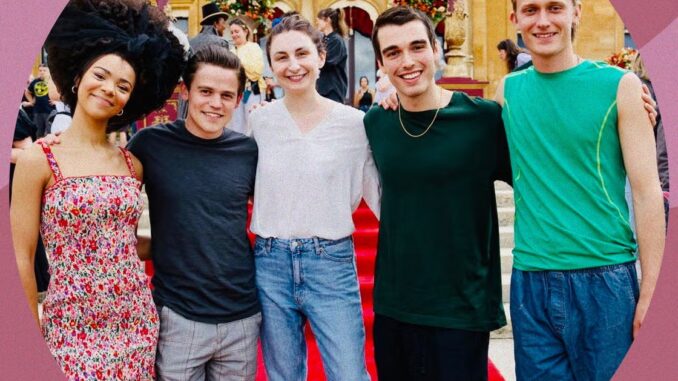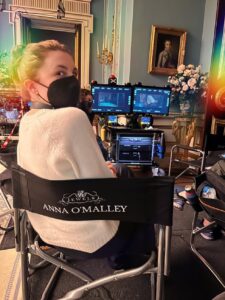
Producer Anna O’Malley has risen through the ranks of television production over the past 15 years, and working on “Queen Charlotte” has been her biggest task of all.
When Anna O’Malley made the decision to move back to London at the start of the pandemic — after being in Los Angeles for six years and working on dream producing jobs like The Handmaid’s Tale and the TV adaptation of Four Weddings and a Funeral — she was trying to figure out what to do next.
“My exact words [to my agent] were ‘Something like Bridgerton,’” says the Dublin native.
Within about three days, O’Malley got a call about Queen Charlotte.
“I was trying to act cool about it,” she says. “Like, ‘Oh, yeah, sure, this is, you know, not a big deal if I don’t get it.’ And then I got it, and I genuinely couldn’t have been happier.”
O’Malley always knew she wanted to tell stories for a living. She was the type of kid who was constantly creating things and making things up, putting plays on in her living room with friends or even running her own radio show, which her brother eventually taped over, thus ending her soon-to-be-illustrious career in radio.
“The moment in my head where I knew I wanted to do something in the arts was when I was 7,” she says. “I was watching Gone With the Wind on the old VHS tapes with my granny, and I remember the drama, the costumes, and just watching it over and over again. I remember thinking, ‘That’s what I wanted to do.’ I wanted to make what they were doing, you know? I was kind of hooked from then.”
As soon as O’Malley graduated from Dublin City University in 2006, she started working as a production assistant and trainee on short films, and then as a production coordinator and assistant to the executive producer on TV shows. She took every job she could, wanting to work constantly to get the experience needed to do bigger projects. She cut her teeth on Downton Abbey, Vikings, Penny Dreadful, Reign, and a popular Irish children’s show, Little Grey Fergie. Over that decade, the goal was always to get to the United States, to Hollywood — that shiny bastion of career highlights that anyone who works in the entertainment industry aspires to. So, O’Malley found a feature film script that she wanted to make and took it to Los Angeles, where she ran around for 18 months getting it financed.

“That was kind of getting to the top of the mountain in terms of producer goals over there,” says O’Malley.
After she filmed She’s Missing in New Mexico, an executive at MGM, whom O’Malley knew from her days on Vikings, offered her a job as an executive in the TV department, and it was a massive career high for O’Malley.
“I worked on such great TV there,” she says. “TV was just getting bigger and bigger and bigger, and it was such a great place to be.”
Now back in London and with one Daytime Emmy nomination for her work in documentary producing on Nat Geo’s Vikings: The Rise and Fall, O’Malley reflects on her time with the overwhelmingly successful Queen Charlotte: A Bridgerton Story. She was one of 11 producers on the prequel series, but it was O’Malley who really ran things day-to-day with a cast and crew of 350, a massive budget, and the reputation of one of the most popular Netflix series casting a glorious sheen over the entire operation. Here, Shondaland talks to the producer extraordinaire about her career and what it took to make Queen Charlotte.
VALENTINA VALENTINI: I feel like most people don’t necessarily know that producers have agents. Do you think that’s true? Why do they need them?
ANNA O’MALLEY: Maybe, but maybe not. Some producers don’t have agents. When I was an independent producer, I didn’t have an agent. When you’re the type of producer getting the film financed, there from day one, casting it, shooting it, selling it, those are independent producers. When you’re working for a studio or a network, you need an agent to find out what’s going on, who has their ear to the ground, and that’s internationally as well. As soon as you start doing shows as big as Queen Charlotte or The Handmaid’s Tale, you need to have somebody who knows what’s going on before you do. So, at this level, producers do have agents.
VV: What are your duties as a producer in general, and what are they on a show of this scale?
AO: There are all different types of producers, but for me, the role is to facilitate the entire show, to make sure everyone has everything they need to do their job, to make sure that they feel respected. If one person isn’t enjoying their job, if they’re not able to do what they need to do, then everything can start crumbling. On an average day on Queen Charlotte, I’ll be working with director Tom Verica, I’ll be working the cast, with the costume designer, production designer, my production team, checking in with Netflix, checking in with Shondaland, then I’ll also be checking in with the junior people and making sure everyone’s okay; I just need to be alert at all times for any imminent disaster that could be coming. Every department will have something that’s really concerning them, and it’s about managing expectations and deciphering whether that concern is something that we can pause on or that we need to figure out very quickly. There’s a lot of troubleshooting, a lot of problem-solving and a lot of remaining very calm. The job involves a lot of resilience, and I guess a sense of humor as well.
